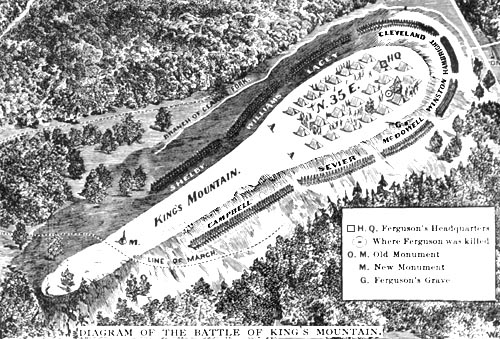William Moore was a bold and fearless fighter during the
Revolutionary war. Taking up his rifle
and horse, he would leave his wife at home to confront the British before they
came to his doorstep.
On making the long journey from Abingdon, Virginia with
Colonel Campbell, he proved himself in the eyes of his leader. He was selected at Cowpens, SC to be a part of
the flying column. This 900-man force
was culled from the bigger army that had come and camped at Cowpens in the hunt
for Major Ferguson. Moore headed off
with this fast-moving contingent that ultimately surrounded the British at Kings
Mountain.
The warriors that fought with Campbell were described by an
injured Tory, Drury Mathis, as darting about the mountain during the battle “like
enraged lions.” Drury went on to say, “they were the most powerful looking men
he had ever beheld; not over-burdened with fat, but tall, raw boned, and sinewy,
with long matted hair…”
William Moore was among these men of the mountains. During the battle he was wounded badly in the
leg and it was amputated in the field to save his life. Moving back over the mountains on a 10-day
journey was not something he could do. Potential
for infection was too high and a lack of medical supplies a reality. He was left in the care of nearby good Samaritans
while his compatriots made the long journey home.
Once at home, they gladly recounted their tails of victory
to all who would listen. An air of joy permeated
the community as the warriors returned.
Among the listeners was Mrs. Moore who inquired about her
husband’s fate.
Hearing that her husband
had been wounded and was still in the area where British General Cornwallis was,
she saddled her own horse and immediately set out in search of her loved one.
Back across the November mountains and down through North
Carolina she rode with bold determination to find her loved one. She camped
beneath the stars and elements. She forded
rivers and streams. Her journey was as like
and long as the army that preceded her, but without the company of thousands of
men.
Bold and fearless she rode on with determined spirit, until at last she found him.
Bold and fearless she rode on with determined spirit, until at last she found him.
Their story certainly had the makings of a ballad. He, leaving home to protect her and she,
leaving home to find and care for him.
They loved and lived to be a ripe old age. Their story was a source of pride and a
touchstone of patriotic fervor for the family generations afterward. (1)
Freedom Reigns!
Freedom Reigns!
(1)
King’s Mountain and Its Heroes: History of
King’s Mountain, October7th, 1780, and the Events Which Led to It, Lyman
Draper, Anthony Allaire













